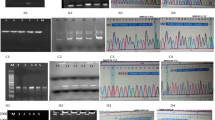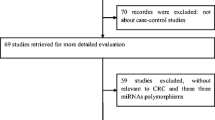Abstract
Colorectal cancer (CRC) is one of the common malignancies worldwide. Single nucleotide polymorphisms in miRNA-binding site on gene transcripts are reported to play important role in increased risk of CRC in different population. We performed a case–control study using 88 CRC patients and 88 non-cancer counterparts to evaluate the association between NOD2 rs3135500 polymorphism located at 3′ untranslated region of the gene and risk of sporadic CRC. Genotyping of rs3135500 polymorphism was performed by polymerase chain reaction–restriction fragment length polymorphism (PCR–RFLP) assay. We found a significant association of AA genotype with risk of CRC (adjusted OR 3.100, CI 1.621–5.930, p < 0.001). Also, significant difference in physical activity (p = 0.001) between case and control groups was found. We also found that individuals in control group were more aspirin or NSAID user compared to sporadic CRC cases (p = 0.002). In the case group, individuals with GG genotype consumed more aspirin or NSAID compared with AA+AG genotypes (33.3 vs. 9.6 %, adjusted OR 4.71, CI 1.25–17.76, p = 0.02). However, in the control group, individuals with AA+AG genotypes used more aspirin or NSAID compared with GG genotypes (47.2 vs. 11.4 %, adjusted OR 14 %, CI 0.05–0.47, p < 0.001).
Similar content being viewed by others
References
Bai Y-H, Lu H, Hong D, Lin C-C, Yu Z, Chen B-C. Vitamin D receptor gene polymorphisms and colorectal cancer risk: a systematic meta-analysis. World J Gastroenterol (WJG). 2012;18(14):1672.
Daraei A, Salehi R, Salehi M, Emami M, Jonghorbani M, Mohamadhashem F, et al. Effect of rs6983267 polymorphism in the 8q24 region and rs4444903 polymorphism in EGF gene on the risk of sporadic colorectal cancer in Iranian population. Med Oncol. 2012;29(2):1044–9.
Moghimi-Dehkordi B, Safaee A, Zali MR. Prognostic factors in 1,138 Iranian colorectal cancer patients. Int J Colorectal Dis. 2008;23(7):683–8.
Landi D, Gemignani F, Barale R, Landi S. A catalog of polymorphisms falling in microRNA-binding regions of cancer genes. DNA Cell Biol. 2008;27(1):35–43.
Chen K, Song F, Calin GA, Wei Q, Hao X, Zhang W. Polymorphisms in microRNA targets: a gold mine for molecular epidemiology. Carcinogenesis. 2008;29(7):1306–11.
Liu C, Zhang F, Li T, Lu M, Wang L, Yue W, et al. MirSNP, a database of polymorphisms altering miRNA target sites, identifies miRNA-related SNPs in GWAS SNPs and eQTLs. BMC Genomics. 2012;13(1):661.
Faber C, Kirchner T, Hlubek F. The impact of microRNAs on colorectal cancer. Virchows Arch. 2009;454(4):359–67.
Yang L, Belaguli N, Berger DH. MicroRNA and colorectal cancer. World J Surg. 2009;33(4):638–46.
Fang Z, Rajewsky N. The impact of miRNA target sites in coding sequences and in 3′ UTRs. PLoS One. 2011;6(3):e18067.
Xiong F, Wu C, Chang J, Yu D, Xu B, Yuan P, et al. Genetic variation in an miRNA-1827 binding site in MYCL1 alters susceptibility to small-cell lung cancer. Cancer Res. 2011;71(15):5175–81.
Mishra PJ, Mishra PJ, Banerjee D, Bertino JR. MiRSNPs or MiR-polymorphisms, new players in microRNA mediated regulation of the cell: introducing microRNA pharmacogenomics. Cell Cycle. 2008;7(7):853–8.
Eaden J, Abrams K, Mayberry J. The risk of colorectal cancer in ulcerative colitis: a meta-analysis. Gut. 2001;48(4):526–35.
Landi D, Gemignani F, Naccarati A, Pardini B, Vodicka P, Vodickova L, et al. Polymorphisms within micro-RNA-binding sites and risk of sporadic colorectal cancer. Carcinogenesis. 2008;29(3):579–84.
Kurzawski G, Suchy J, Kładny J, Grabowska E, Mierzejewski M, Jakubowska A, et al. The NOD2 3020insC mutation and the risk of colorectal cancer. Cancer Res. 2004;64(5):1604–6.
Tian Y, Li Y, Hu Z, Wang D, Sun X, Ren C. Differential effects of NOD2 polymorphisms on colorectal cancer risk: a meta-analysis. Int J Colorectal Dis. 2010;25(2):161–8.
Papaconstantinou I, Theodoropoulos G, Gazouli M, Panoussopoulos D, Mantzaris GJ, Felekouras E, et al. Association between mutations in the CARD15/NOD2 gene and colorectal cancer in a Greek population. Int J Cancer. 2005;114(3):433–5.
Liu J, He C, Xu Q, Xing C, Yuan Y. NOD2 polymorphisms associated with cancer risk: a meta-analysis. PLoS One. 2014;9(2):e89340.
Abulí A, Bessa X, González JR, Ruiz-Ponte C, Cáceres A, Muñoz J, et al. Susceptibility genetic variants associated with colorectal cancer risk correlate with cancer phenotype. Gastroenterology. 2010;139(3):788–96.
Azimzadeh P, Romani S, Mohebbi SR, Mahmoudi T, Vahedi M, Fatemi SR, et al. Association of polymorphisms in microRNA-binding sites and colorectal cancer in an Iranian population. Cancer Genet. 2012;205(10):501–7.
Nakajima N, Kuwayama H, Ito Y, Iwasaki A, Arakawa Y. Helicobacter pylori, neutrophils, interleukins, and gastric epithelial proliferation. J Clin Gastroenterol. 1997;25:S198–202.
Jaiswal M, LaRusso NF, Burgart LJ, Gores GJ. Inflammatory cytokines induce DNA damage and inhibit DNA repair in cholangiocarcinoma cells by a nitric oxide-dependent mechanism. Cancer Res. 2000;60(1):184–90.
Tuupanen S, Alhopuro P, Mecklin JP, Järvinen H, Aaltonen LA. No evidence for association of NOD2 R702W and G908R with colorectal cancer. Int J Cancer. 2007;121(1):76–9.
Angeletti S, Galluzzo S, Santini D, Ruzzo A, Vincenzi B, Ferraro E, et al. NOD2/CARD15 polymorphisms impair innate immunity and increase susceptibility to gastric cancer in an Italian population. Hum Immunol. 2009;70(9):729–32.
Ye J-J, Cao J. MicroRNAs in colorectal cancer as markers and targets: recent advances. World J Gastroenterol (WJG). 2014;20(15):4288.
Feng Z, Zhang C, Wu R, Hu W. Tumor suppressor p53 meets microRNAs. J Mol Cell Biol. 2011;3(1):44–50.
Manne U, Shanmugam C, Bovell L, Katkoori VR, Bumpers HL. miRNAs as biomarkers for management of patients with colorectal cancer. Biomark Med. 2010;4(5):761–70.
Wang Y, Lee CG. MicroRNA and cancer—focus on apoptosis. J Cell Mol Med. 2009;13(1):12–23.
Cekaite L, Rantala JK, Bruun J, Guriby M, Ågesen TH, Danielsen SA, et al. MiR-9,-31, and-182 deregulation promote proliferation and tumor cell survival in colon cancer. Neoplasia. 2012;14(9):868–IN21.
Huang Z, Huang D, Ni S, Peng Z, Sheng W, Du X. Plasma microRNAs are promising novel biomarkers for early detection of colorectal cancer. Int J Cancer. 2010;127(1):118–26.
Schepeler T, Reinert JT, Ostenfeld MS, Christensen LL, Silahtaroglu AN, Dyrskjøt L, et al. Diagnostic and prognostic microRNAs in stage II colon cancer. Cancer Res. 2008;68(15):6416–24.
Faltejskova P, Svoboda M, Srutova K, Mlcochova J, Besse A, Nekvindova J, et al. Identification and functional screening of microRNAs highly deregulated in colorectal cancer. J Cell Mol Med. 2012;16(11):2655–66.
Parasramka MA, Dashwood WM, Wang R, Saeed HH, Williams DE, Ho E, et al. A role for low-abundance miRNAs in colon cancer: the miR-206/Krüppel-like factor 4 (KLF4) axis. Clin Epigenet. 2012;4(1):16–26.
Vainio H, Morgan G, Kleihues P. An international evaluation of the cancer-preventive potential of nonsteroidal anti-inflammatory drugs. Cancer Epidemiol Biomark Prev. 1997;6(9):749–53.
Ruder EH, Laiyemo AO, Graubard BI, Hollenbeck AR, Schatzkin A, Cross AJ. Non-steroidal anti-inflammatory drugs and colorectal cancer risk in a large, prospective cohort. Am J Gastroenterol. 2011;106(7):1340–50.
Chia WK, Ali R, Toh HC. Aspirin as adjuvant therapy for colorectal cancer—reinterpreting paradigms. Nat Rev Clin Oncol. 2012;9(10):561–70.
Acknowledgments
Authors are grateful to the Vice Chancellor for Research, Isfahan University of Medical Sciences, for financial support.
Conflict of interest
We declare that there is no any conflict of interest.
Author information
Authors and Affiliations
Corresponding author
Rights and permissions
About this article
Cite this article
Ahangari, F., Salehi, R., Salehi, M. et al. A miRNA-binding site single nucleotide polymorphism in the 3′-UTR region of the NOD2 gene is associated with colorectal cancer. Med Oncol 31, 173 (2014). https://doi.org/10.1007/s12032-014-0173-7
Received:
Accepted:
Published:
DOI: https://doi.org/10.1007/s12032-014-0173-7




